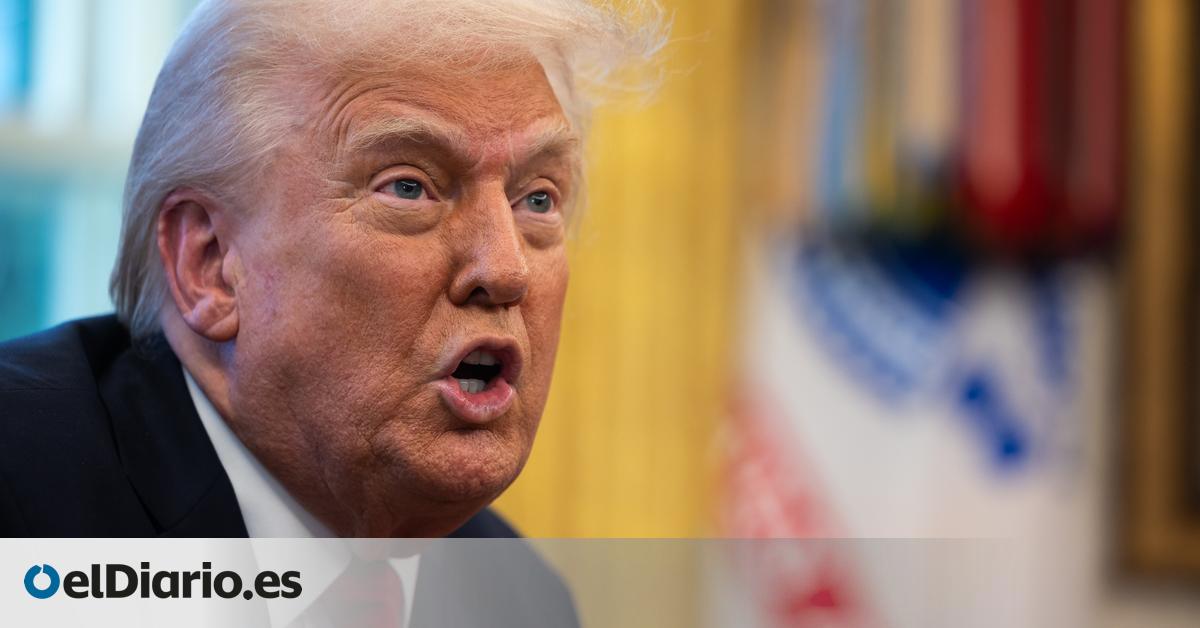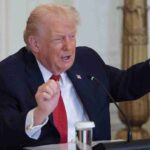
A little less than three months ago Donald Trump returned to the White House and has put the world upside down opening a new world order. In the geopolitical, he hit the table at the beginning of conversations with Vladimir Putin outside his NATO allies – and of Ukraine -, soliviated Europeans with their imperialist desires and anticipated their disconnection of euroatlántic security that has been in force in the last 80 years. And, this Wednesday, what has called the ‘Day of Liberation’, as if the first world power was subjugated, threatens an unpublished commercial war.
Trump’s erratic and chaotic politics generates uncertainty, both in the markets and in the rest of the world, especially the dirty ’15 ‘, the states that await a resurgence of the commercial war beyond the rates it has announced, as 25% to steel and aluminum or 25% to vehicles. One of the victims is the European Union, the political and commercial bloc of the 27 countries that Trump has put in the Diana. In their team they consider them “pathetic” and “gorrones.”
The EU was caught by surprise eight years ago the volatility of the most powerful man in the world, but now the community block has a greater preparation. Beyond the economic coup that would be the generalized rates and the ‘reciprocal tariffs’ with which Trump is stirred against measures such as VAT, which taxed all consumers equally, the great challenge that EU has is to maintain unity in the answer. And that is the appeal that the first conatos make the European capitals.
The fear of reprisals
But it will not be easy. The seams are already being seen with the first response prepared by the European Commission to the first batch of tariffs to aluminum and steel. Brussels advocated automatically reintroducting on April 1 the rates that entered into force in 2018 before Trump’s first envy. Among the affected products were LEVI’s jeans, Harley-Davidson motorcycles, Bourbon whiskey, cosmetic, agricultural products or even vessels for a value of 8,000 million. To reach the 26,000 million that it is estimated that Washington measures would reach, the community government raised a list that would be implemented a few days later.
However, Trump’s threat to impose a 200% tax on wine, champagne and alcoholic beverages from the 27 European: “He reused a very old list without reinterpreting it, as he should have done.”
From there, the European Commission put in standby The entry into force of the tariff until April 12 with the intention of imposing the entire package at the same time and thus margin far.
Before the escalation of the threat, the Italian Prime Minister, Giorgia Meloni, demanded a “reasonable” approach in the answer. “Of course there are differences on the table in terms of tariffs, but precisely why I think we should not act by impulse, but reasoned,” he said this weekend. The ultra -rightist leader of Fratelli d’Italia is in a complicated situation because she is one of Trump’s allies in Europe, along with the Hungarian Viktor Orbán, but her relationship is not being bound at the moment and the sectors attacked by the US, such as the viticulture and the car, are especially relevant to the economy of that country.
Wine entrepreneurs estimate that they have lost 100 million euros a week since Trump threatened to tax European alcoholic beverages since importers have canceled orders preventively. In Spain, this sector also worries that it is the second agri -food product that most exports to that country (behind olive oil). Spanish wine imports amounted to 391 million euros, being the fourth supplier in economic terms. Even so, Spain would not be one of the most affected countries since the commercial balance is negative (it matters more than it exports) and, for example, in the case of automotive the damage would be practically null (in 2024 no vehicle was sold to that country). The manufacturing sector has detected a drop in orders for the second consecutive month.
But the situation is different in Germany, for example, that prepares for a hard blow in one of its main industries, which is already in low hours. Ireland has also warned that he will be one of the most damaged and has asked the European Commission for a “strategic” response. The institutions of that country predict a fall in the growth of its economy, which depends largely on the US, with whom it has a commercial surplus of 70,000 million. Drug tariffs will make special damage to the great presence of pharmaceuticals thanks to their tax advantages and narrow fear because it takes measures regarding digital services to try to recover the ‘big tech’ implemented in that country.
A “solid plan” with several edges
With that scenario that has the EU in suspense and with the fear of an economic stagnation, the president of the European Commission, Ursula von der Leyen, said she has a “solid plan” to respond to Trump. “Europe has many letters: from commerce to technology, going through the size of our market. But this force is also based on our willingness to make firm countermeasures,” said the German in the European Parliament on the eve of the US president to announce his measures.
“All instruments are on the table,” said Von der Leyen. Among the tools available to the EU to deal with the war unleashed by Trump is the anti-coercion instrument, which has never been used but was designed precisely following the first mandate of the Republican leader to deal with this type of commercial blackmail. Known as ‘Bazuca’ for the repercussions of its activation, what it pursues is to punish those powers that use commercial damage to try to influence community policy. Thus, the defenders of activating that tool indicate it in the event that Trump tariffs are justified in measures such as VAT or intend to respond to European digital legislation that puts the large platforms, such as X or goal.
Among the measures that can be launched with the ‘Bazuca’ are the increase in customs rights, import or export restriction, the exclusion of participating in public tenders or the suspension of international obligations in sectors such as intellectual property, insurance, banking, etc.
Caution: options beyond reprisals
The appeal made by the capitals, which also recognizes the European Commission, and above all entrepreneurs is the need to strengthen the community block from within more than taking reprisals that will take its toll on both sides of the Atlantic. “The EU needs to safeguard its economic interests and improve its resilience through an ambitious market diversification agenda,” they point out from the Business Europe employer. “In a time of so much geopolitical uncertainty, the EU needs to urgently strengthen its economy and competitiveness to protect against economic blackmail,” says General Director Markus J. Beyrer.
As for diversification, the EU is trying to seek alliances with other countries, such as India, South Africa, Mexico, Thailand or the Mercosur states. This same week, von der Leyen and the president of the European Council, Antònio Costa, will travel to Samarcanda (Uzbequistan) for the first central UE-Asian summit. Efforts are also focusing on recomposing relations with China.
Among the weapons that the EU has to face the commercial war, is the depreciation of the euro through the monetary policy of the ECB, which would have to have a maneuvering margin to lower interest rates in the coming months. With a lower euro than the dollar, European products and services would automatically reduce compensating the effect of US tariffs and the competitiveness of that country’s exports would be reduced.
Another option would be taxes on multinationals and rich Americans. An response that does not generate inflation, and that has been led by economists and organizations that defend greater global fiscal justice, and that are in favor of setting mandatory minimal minimal coordinated taxes worldwide to large companies and billionaires, as published by Eldiario.es.
Source: www.eldiario.es

